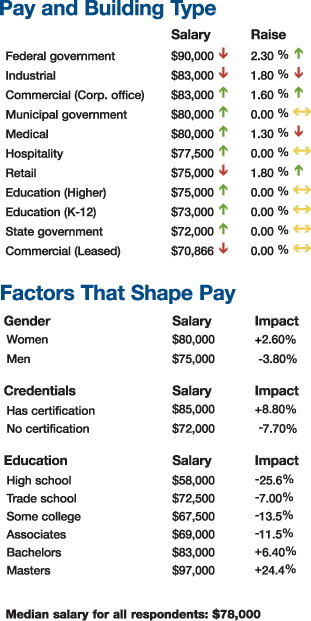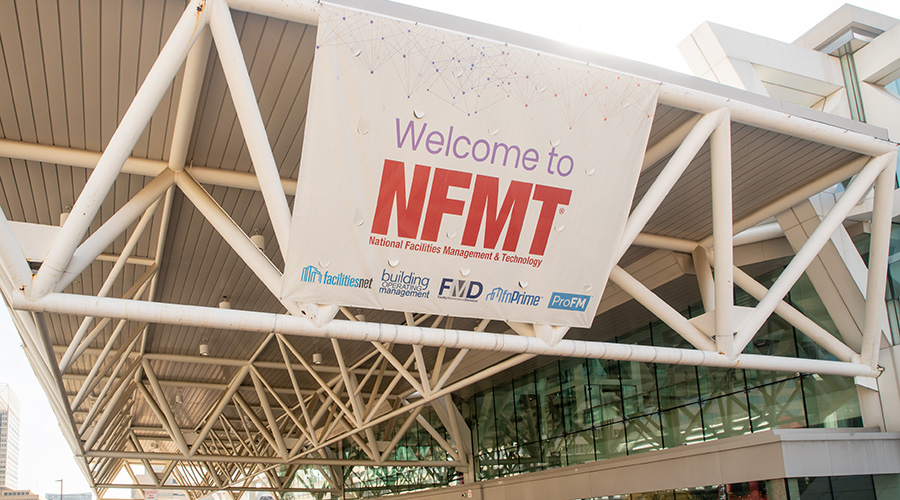Education, Certification and Building Type Influence Pay
While a college degree can sometimes be important, it is generally not an essential criterion for moving up the career ladder in facility management. Certification is another story. About 50 percent of facility managers at the Smithsonian do not have college degrees, but everyone — assistant managers, building managers, and zone managers — are encouraged to take Certified Facility Manager (CFM) training through the International Facility Management Association (IFMA).
"Some of our managers may have no formal education outside of high school, but they are very smart and continuously learn and move up through the ranks" says Bechtol.
Education becomes more important as the size and complexity of a job increases, said Tuveson. For a large campus or complex, some combination of education and experience will be important, and education includes certification. Certification indicates "this person has a competency and knows how to solve problems" says Tuveson.
Marriott looks for certification, says Jachimowicz, and the company has invested in training with BOMI International. "They have different certifications" he says. "The one we put our directors and some chief engineers through for the director level is Facilities Management Administrator — the FMA"
At Marriott, someone with a degree in a pertinent field is looked upon favorably, but a candidate who doesn't have a degree but does have solid experience and some type of certification would not be passed over.
One reason that certification is important is that it demonstrates ongoing professional growth. "When was the last time you took a refresher course, got certified, or went to a seminar pertaining to your industry" Rozengota asks. Recruiters will be interested in the answers to these questions. A growing number of facility managers are going for LEED accreditation, which shows a practitioner is on the cutting edge, says Rozengota.
Also key is how involved a candidate is in his or her career. According to Rozengota, belonging to a local chapter of IFMA, engaging with the FM community, and contributing to the industry are all "a big deal"
Even though many companies have cut back on training, that is no excuse for individuals to stop developing themselves, especially if they want to get ahead. In addition to taking an interest in one's own professional and personal development, it is important to embrace change, which means "you have to do more with less, be technologically savvy and be a generalist with expertise in three or four areas" Jachimowicz says. Job losses necessitate a reinvention of the business model, he says. Larger spans of control mean there are fewer leaders — but those who succeed will be people who can do more with less, think outside the box and embrace technology as an enabler.
Those looking for a new position should have their name out in public, says Rozengota. That means networking, not only over the phone, at trade shows or via e-mail, but also by using social networking sites ranging from MyFacilitiesnet.com, which targets FMs, to broad sites like LinkedIn and Facebook. Keeping visible may also mean joining a professional chapter or getting published — steps that can be especially important for managers wanting to make the step to the director level, says Rozengota. While it is somewhat difficult to move up the ladder right now, he predicts more movement in upcoming years than in the previous 20 years because of a wave of retirements that will occur in the next decade.
At least for today, the reality is that facility managers have to be willing to take on a bigger role without the assumption they will be paid more, Jachimowicz says. Gone are the days when people were promoted simply because they had long tenure and it was time to move up, or because they had worked hard. "You have to consistently deliver and exceed expectations" he says. "The bar has been raised in terms of performance. Today it is all about results"
Maryellen Lo Bosco is an Asheville, N.C.-based freelance writer who covers the facility market.

Related Topics:














